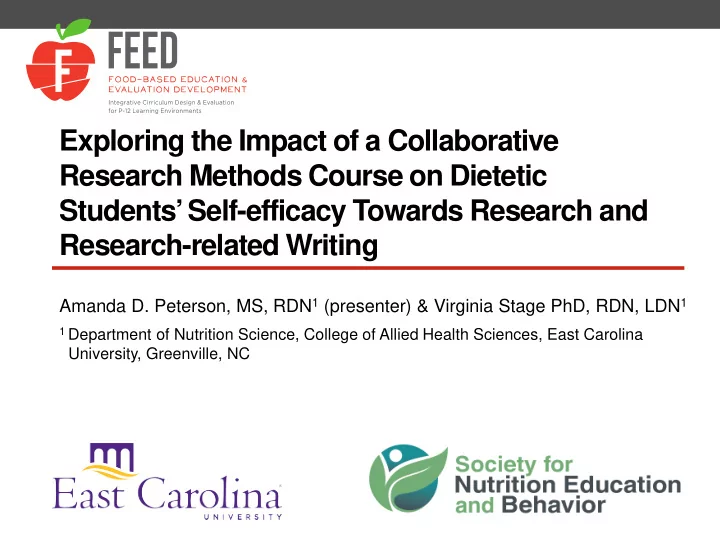

Exploring the Impact of a Collaborative Research Methods Course on Dietetic Students’ Self-efficacy Towards Research and Research-related Writing Amanda D. Peterson, MS, RDN 1 (presenter) & Virginia Stage PhD, RDN, LDN 1 1 Department of Nutrition Science, College of Allied Health Sciences, East Carolina University, Greenville, NC
Introduction Accreditation Council for Education in Nutrition and Dietetics (ACEND) undergraduate coursework requirements for research: Research methodology Interpreting literature Integrating research Approximately one third of dietitians collect data and review literature 1%-8% of dietitians engage in and disseminate research findings Perceived research writing skills and confidence and may influence the involvement of dietitians future involvement Citations: ACEND, 2009; Byham-Gray, Gilbridge, Dixon, Stage, 2005; Oring & Goodwin, 1993
Objective To discuss the influence and course design of a collaborative research methods laboratory course on upper-level dietetic student’s self-efficacy towards research and research-related writing Session Outline Brief introduction to the methodology course and lab Discuss course overview and design Laboratory course influence on student’s self-efficacy
Course Overview Research Methodology Course: Learning how to understand, interpret, and critically evaluate scientific literature Understanding various methodologies and the major steps in the research process Developing technical writing skills Laboratory Course : Methodology Laboratory Designated classroom time for: Course Course Data entry (e.g. SPSS) and management Learning and reviewing statistics Developing professional posters and presentation skills
Course/Lab Requirements R General Course and Lab Requirements IRB training Develop research questions and hypothesis for research topic Annotated bibliography Literature review In-class research article review and discussion Concept mapping SPSS data entry and analysis project Research brief including abstract, introduction, methods, results, discussion, and application Oral presentation Poster presentation with multiple practice rounds Course Lab Table 1. Overview of General Course Requirements for Research Methodology and Lab
General Overview Figure 1. General Overview for Undergraduate Research Methodology Course & Lab
Course/Lab Design Improving Students’ Writing Efficacy Concept Mapping Identifying themes Aiding in the writing process Draft submissions with feedback Trained Writing Mentors Peer consultants Mandatory writing mentor meetings Provide feedback on writing
Course/Lab Design Improving Students’ Research Efficacy Lectures/PowerPoint Clicker questions for students to assess their understanding In-class Group Discussions Assigned articles correspond to lecture material (e.g. study designs) Peer-to-peer feedback (e.g. round room feedback) In-class Activities Real-time application of lecture material Hands-on learning (e.g. SPSS) Ability to ask questions
Student Feedback Student-perceived helpful aspects of course material: “One aspect that has really Teaching style/enthusiasm helped me is working on one section at a time and putting it Past student examples all together in the end .” Instructor feedback and openness to questions Visual depictions of the research process Systematic approach to individual sections Organization & reminders In-class work times
Influence on Efficacy Integrated research-related laboratory courses not required in accredited dietetics programs. Additional class-time and laboratory activities may be advantageous to students research and technical writing skill development. Purpose To explore the influence of a research methods laboratory course on student’s self-efficacy for research efficacy (RE) and research-related writing (WE).
Methods n=30 Pre/post assessment surveys Assess changes in self-efficacy for research (RE) and technical writing (WE) 5-point scales Utilized existing and researcher-developed tools to assess WE and RE, respectively Descriptive statistics, Mann-Whitney U, and Wilcoxon Signed Rank were employed to analyze data. Qualitative data Pre/post assessment “What research skills are important”? Citation: Honeck, 2013
Results Significant improvements in research efficacy pre-post for 23 items Students enrolled in the lab course demonstrated significant improvements in Writing Efficacy pre-post for 12 items. Figure 4. Pre-Post assessment for Writing Efficacy (WE) Figure 3. Pre-Post assessment for Research Efficacy among students enrolled in NUTR 3500/3501 (RE) among students enrolled in NUTR 3500/3501 1= Not Confident At All, 2= Not Confident, 3=Confident, 1= Not Confident At All, 2= Not Confident, 3=Confident, 4=Somewhat Confident, 5=Very Confident 4=Somewhat Confident, 5=Very Confident *p≤.05 *p≤.05
Results (continued) Post-assessment Pre-assessment Figure 2. Research Methodology and supporting laboratory course responses to the question “What research skills are important”?
Discussion Prior research suggests writing skills may be lacking among RDs. Students that gained experience in research and writing tasks through a research lab course have gains in their self-efficacy in research and technical writing skills. Students may not be fully aware of efficacy gains while participating in research and research related writing activities. Future Research: Students perceptions of their abilities and actual gains perceived by faculty Impact of prior research experience Citations: Anchondo, Campbell, Zoellner, 2014; Hunter, Laursen, Seymour, 2007; Hayes & Peterson, 2003
References Anchondo IM, Campbell C, Zoellner J. Academy of Nutrition and Dietetics 2011 survey on member research activities, needs, and perceptions. J Acad Nutr Diet . 2014;114(5):803-810. Byham-Gray L, Gilbridge J, Dixon B, Stage F. Evidence-based practice: What are dietitians’ perceptions, attitudes, and knowledge? J Am Diet Assoc. 2005;105 ,(10):1574-1581. Commission on Accreditation for Dietetics Education, American Dietetic Association. Eligibility requirements and accreditation standards for didactic programs in dietetics. http://www.eatright.org/uploadedFiles/ CADE/Accreditation/DPD_2008_ERAS_v0-1_2 009-07-18_1200.pdf. Published March 2009. Cox MF, & Androit A. Mentor and undergraduate student comparisons of students’ research skills. J STEM Ed. 2009;10(1):31-39. Gardner JK, Rall LC, Peterson CA. Lack of multidisciplinary collaboration is a barrier to outcomes research. J Am Diet Assoc . 2002;102(1):65-71. Hays J, Peterson C. Use of an outcomes research collaborative training curriculum to enhance entry-level dietitians’ and established professionals’ self-reported understanding of research. J Am Diet Assoc . 2003; 103, 77-84. Honeck AY. Assessing perceived writing self-efficacy beliefs in the community college environment. School of Education Student Capstones and Dissertations. 2013, Paper 507. http://digitalcommons.hamline.edu/hse_all/507 Hunter AB, Laursen SL, Seymour E. Becoming a scientist: The role of undergraduate research in students' cognitive, personal, and professional development. Sci Ed. 2007:91: 36–74. Kritikos VS, Carter S, Moles RJ, Krass I. Undergraduate pharmacy students’ perceptions of research in general and attitudes towards pharmacy practice research. Int J Pharm Pract. 2013;21(3):192-201. Oring K, Goodwin J. Integrating research and grant writing in an undergraduate dietetics program. J Am Diet Assoc . 1993;93:1293-1295.
Acknowledgements
Questions/Comments?
Recommend
More recommend